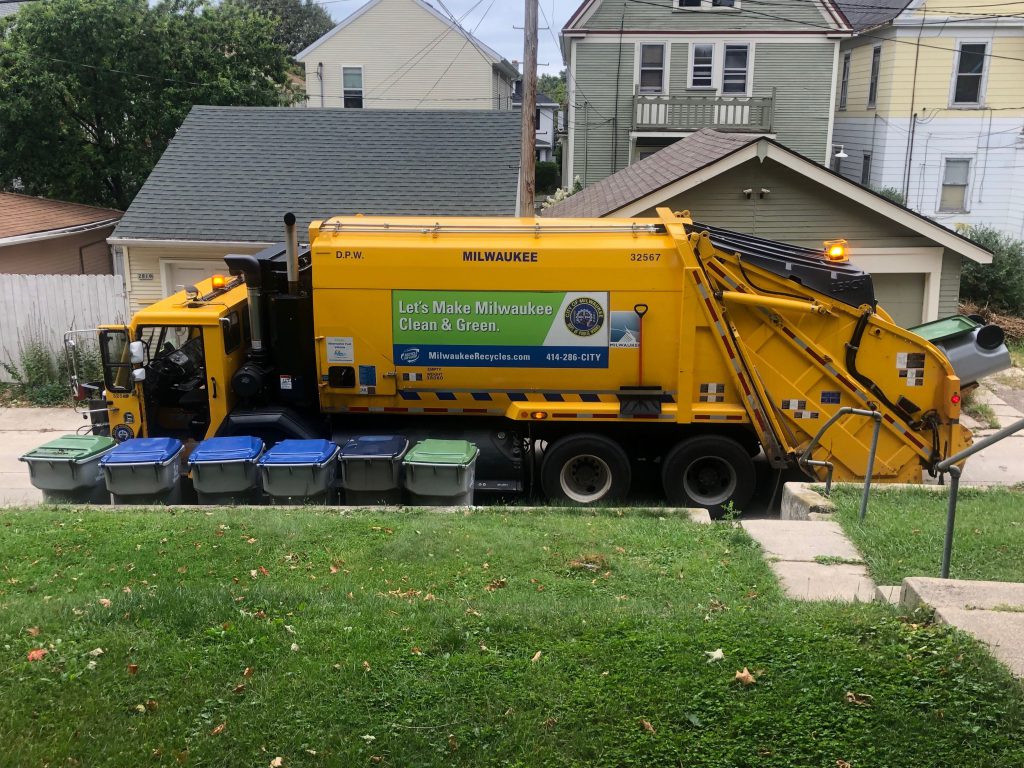Milwaukee Moving to Biweekly Recycling Pickup
$1 million grant from non-profit will kickstart program. Change would start in early 2021.
An approximately $1 million grant from a non-profit, The Recycling Partnership, will support Milwaukee’s effort to increase recycling pickup frequency from once every three weeks to once every two weeks.
“I think people are going to appreciate it,” said Mayor Tom Barrett in an interview. “They will be pleased with the improved consistency.”
The grant would support the uniform implementation of every-other-week pickup. Currently, many of the city’s 181,133 households have their recycling picked up every three weeks from 95-gallon carts. But over 18,000 households in an area bounded by W. Capitol Dr., W. Canal St., N. 35th St. and the Milwaukee River use smaller 18-gallon bins and get it picked up weekly.
The city’s on-going cost will be approximately $125,000 to support the increased pickup frequency after factoring in the reduction in landfill costs. “We thought the $125,000 was worth it,” said Barrett.
A draft grant agreement says city-wide, bi-weekly pickup has an anticipated start date of April 1st, 2021.
The Common Council will also need to sign off on the proposal. It will first go before the Public Works Committee on Wednesday. Council members Robert Bauman and Jose G. Perez are listed as file sponsors.
Increasing the frequency of pickups is expected to increase the volume of material recycled. “The estimate we have is it’s going to result in 10 million more pounds of recycling annually,” said Barrett. A city report estimates that it is the equivalent of taking 3,191 vehicles from the road, a net reduction of 15,031.52 metric tons of carbon dioxide emissions annually.
The Recycling Partnership provided the city with a $30,000 grant in 2019 to study the matter.
The change would only impact those living in one to four family homes.
According to its 2017 annual report The Recycling Partnership’s funders include Coca Cola, Exxon Mobil, Protector & Gamble, the American Chemistry Council and the Can Manufacturers Institute. The organization, which has an 18-member staff, facilitated $29 million in investments in recycling infrastructure in 2017 through a grant program that requires a seven-to-one local match. The organization worked with 583 communities that year leading to a diversion of 115 million pounds of recyclables and, according to an Environmental Protection Agency formula, avoided the generation of 164,000 metric tons of greenhouse gases.
The change comes as recycling programs have struggled across the country in the wake of a dramatic reduction in the volume of recycled materials purchased by China. Barrett said he has watched the trend closely, no doubt concerned that the reduction in demand is costing the city at least $457,000 annually.
“Where we have been fortunate is we have been able to concentrate our efforts in the Midwest,” said Barrett of where the city’s recycled material ultimately goes. Recycled paper and other materials are sold to industrial customers in the region, an asset for the city and a negative for cities like Philadelphia and Memphis that are located further from paper mills and other large customers for recycled materials.
The city currently spends approximately $10 million on recycling annually, a cost that is reduced to approximately $5 million after revenue from selling materials, state grants and avoided landfill disposal costs are factored in.
Legislation Link - Urban Milwaukee members see direct links to legislation mentioned in this article. Join today
If you think stories like this are important, become a member of Urban Milwaukee and help support real, independent journalism. Plus you get some cool added benefits.
City Hall
-
Council Blocked In Fight To Oversee Top City Officials
 Dec 16th, 2025 by Jeramey Jannene
Dec 16th, 2025 by Jeramey Jannene
-
Latest Effort to Adopt New Milwaukee Flag Going Nowhere
 Dec 3rd, 2025 by Jeramey Jannene
Dec 3rd, 2025 by Jeramey Jannene
-
After Deadly May Fire, Milwaukee Adds New Safety Requirements
 Dec 2nd, 2025 by Jeramey Jannene
Dec 2nd, 2025 by Jeramey Jannene























This is an important, albeit small, step. Thanks to whomever worked the grant!
The three week schedule seems to work just fine for our neighborhood, so the million dollars could be better spent on other issues.
Our City of Milwaukee “leaders” are oblivious to more urgent problems: our poverty stricken ghetto continues to be ignored–
childhood malnutrition, housing abuses by slumlords, severe unemployment, crime, lead abatement, healthcare for the impoverished, etc..
Spend the money where it is needed.
Mr. Susterich – I’m just spitballing here but the grantor in this case – the Recycling Partnership, probably has guidelines for their grants that are specific to recycling.